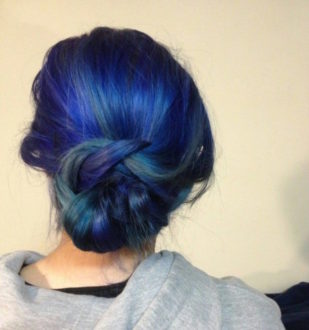The first time I was ever turned down for a job, I was outraged, and frankly a little alarmed. Somehow, inexplicably, my eleven years in the American secondary education system had not prepared me for this moment.
The problem was my hair. Every inch of it was bright, peacock blue. And when I decided to dye it at the ripe old age of fifteen, it never occurred to me that my hair color could have anything other than a superficial effect on me. Unsurprisingly, my fifteen-year-old self lacked a certain element of foresight.
For someone who spent most of her life as the picture of a studious suburban younger sister, it was bewildering and concerning to suddenly be branded rebellious, trouble making and contemptible, just for the way I looked. I was turned away from jobs; I saw the way that people (even those who knew me) addressed me turn on a dime; I was even mocked by a crotchety old British customs officer. For some reason, people felt that the color of my hair gave them license to give their unsolicited opinions on everything from my appearance to my lifestyle choices.
But after a few weeks of staring and pointing from all directions, the disapproval of strangers suddenly became much less important to me. I knew what my hair looked like, and I’d wanted it that way.
Lessons I learned in my year of blue hair:
- How to deal with unexpected consequences
For the first fifteen years of my life, I was pretty good at handling calculated risk. Mostly, I just didn’t take them. I planned meticulously, and most of the time my plans worked out.
That was not my experience with hair dye. I’ll admit, I nearly called off the whole endeavor after my first major hair-dye mistake. I’d fried off a chunk of my hair with bleach, and the minute I pulled off the aluminum I knew it was game over. The hair looked like my mom’s favorite glass noodle dish: gummy and fragile.
I sometimes had weeks of bad-hair day, when I went too far with bleach or dye. There were bumps in the road. Hair was chemically fried off and judgments were made. It was really hard for me to accept — I always like a situation 100% under control.
But it quickly became apparent that, in fact, it’s almost never the end of the world. Hair grows, and, like most things, sorts itself out over time. Those moments of societal failure that seemed all consuming were really just moments. They passed.
- The value of structured experimentation
For the first time in my life, I really started to appreciate the scientific method as explained by four years of high school science teachers, but that’s beside the point.
I’m usually content to skip over the finicky, burdensome parts of labs — like reading the full instructions and always wearing goggles — but after my first foray into dying my hair, I realized that preparation is key. If you’re dying your hair and you don’t have your gloves, aluminum foil, towel, mixing bowls and brushes within arms reach at all times, there’s no saving yourself, and there’s nobody else to blame.
- How to take a compliment
Before dying my hair, if I ever received a compliment for anything at all, I would immediately scramble for an appropriate reaction, spluttering and gesticulating, most likely with a horrified semi-smile plastered on my face.
If they complimented my shirt, I had to compliment them for theirs in return. It was ridiculous, but I had to. There was no other option; society just wouldn’t allow for anything else.
But when somebody says, “I love your blue hair,” there’s not a textbook response. So I learned to just say, “Thank you.”
- How to do what I want to do
What strangers think about you often has very little to do with the reality of who you are. I did what I wanted to do, and I got a lot of flack for it from teachers, strangers and friends. But it helped me realize that, even if it rubs people the wrong way, you can do anything you want as long as you’re willing to deal with the consequences. And that was strangely empowering for me. To know that something as trivial as dying my hair could flip people’s perception of me upside down, but that I could still live and succeed without the luxury of others’ approval.
Contact Maximiliana Bogan at ebogan ‘at’ stanford.edu.
